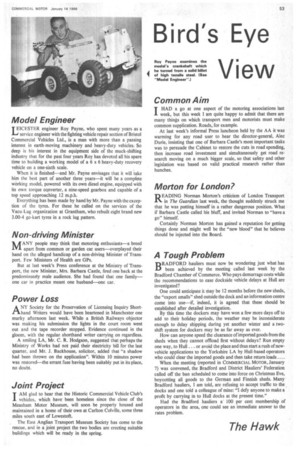Bird's Eye View
Page 55

If you've noticed an error in this article please click here to report it so we can fix it.
Model Engineer
T T
EIC ESTER engineer Roy Payne, who spent many years as a service engineer with the fighting vehicle repair section of Bristol Commercial Vehicles Ltd., is a man with more than a passing interest in earth-moving machinery and heavy-duty vehicles. So deep is his interest in the equipment side of the muck-shifting industry that for the past four years Roy has devoted all his spare time to building a working model of a 6 x 6 heavy-duty recovery vehicle on a one-sixth scale. When it is finished—and Mr. Payne envisages that it will 'take him the best part of another three years—it will be a complete working model, powered with its own diesel engine, equipped with its own torque converter, a nine-speed gearbox and capable of a top speed approaching 12 m.p.h. Everything has been made by hand by Mr. Payne with the exception of the tyres. For these he called on the services of the Vacu-Lug organization at Grantham, who rebuilt eight brand new 3.00-4 go-kart tyres in a rock lug pattern.
Non-driving Minister
MANY people may think that motoring enthusiasts—a breed apart from common or garden car users—overplayed their hand on the alleged handicap of a non-driving Minister of Transport. Few Ministers of Health are GPs.
But at last week's Press conference at the Ministry of Transport, the new Minister, Mrs. Barbara Castle, fired one back at the predominately male audience. She had found that one family— one car in practice meant one husband—one car.
Power Loss
ANY Society for the Preservation of Licensing Inquiry Shorthand Writers would have been heartened in Manchester one murky afternoon last week. While a British Railways objector was making his submission the lights in the court room went out and the tape recorder stopped. Evidence continued in the gloom, with the regular shorthand writer carrying on regardless. A smiling LA, Mr. C. R. Hodgson, suggested that perhaps the Ministry of Works had not paid their electricity bill for the last quarter, and Mr. J. Backhouse, solicitor, added that "a shadow had been thrown on the application". Within 10 minutes power was restored—the errant fuse having been suitably put in its place, no doubt.
Joint Project
T AM glad to hear that the Historic Commercial Vehicle Club's 1 vehicles, which have been homeless since the close of the Measham Motor Museum, will soon be properly housed and maintained in a home of their own at Carlton Colville, some three miles south east of Lowestoft. The East Anglian Transport Museum Society has come to the rescue, and in a joint project the two bodies are erecting suitable buildings which will be ready in the spring.
Common Aim
T HAD a go at one aspect of the motoring associations last 1 week, but this week I am quite happy to admit that there are many things on which transport men and motorists must make common supplication. Roads, for example. At last week's informal Press luncheon held by the AA it was warming for any road user to hear the director-general, Alec Mee, insisting that one of Barbara Castle's most important tasks was to persuade the Cabinet to restore the cuts in road spending, then increase road investment and simultaneously get road research moving on a much bigger scale, so that safety and other legislation was based on valid practical research rather than hunches.
Morton for London?
EADING Norman Morton's criticism of London Transport JINin The Guardian last week, the thought suddenly struck me that he was putting himself in a rather dangerous position. What if Barbara Castle called his bluff, and invited Norman to "have a go" himself. Certainly Norman Morton has gained a reputation for getting things done and might well be the "new blood" that he believes should be injected into the Board.
A Tough Problem
BRADFORD hauliers must now be wondering just what has been achieved by the meeting called last week by the Bradford Chamber of Commerce. Who pays demurrage costs while the recommendations to ease dockside vehicle delays at Hull are investigated? One could anticipate it may be 12 months before the new sheds, the "export smalls" shed outside the dock and an information centre come into use—if, indeed, it is agreed that these should be established after detailed investigation. By this time the dockers may have won a few more days off to add to their holiday periods, the weather may be inconsiderate enough to delay shipping during yet another winter and a twoshift system for dockers may be as far away as ever. How can anyone speed the clearance of imported goods from the sheds when they cannot offload first without delays? Run empty one way, to Hull . . . or avoid the place and thus start a rush of newvehicle applications to the Yorkshire LA by Hull-based operators who could clear the imported goods and then take return loads .... When the meeting (reported in COMMERCIAL MOTOR, January 7) was convened, the Bradford and District Hauliers' Federation called off the ban scheduled to come into force on Christmas Eve, boycotting all goods to the German and Finnish sheds. Many Bradford hauliers, I am told, are refusing to accept traffic to the docks and one told a colleague of mine: "I defy anyone to make a profit by carrying in to Hull docks at the present time."
Had the Bradford hauliers a 100 per cent membership of operators in the area, one could see an immediate answer to the rates problem.
The Hawk
















































































































































